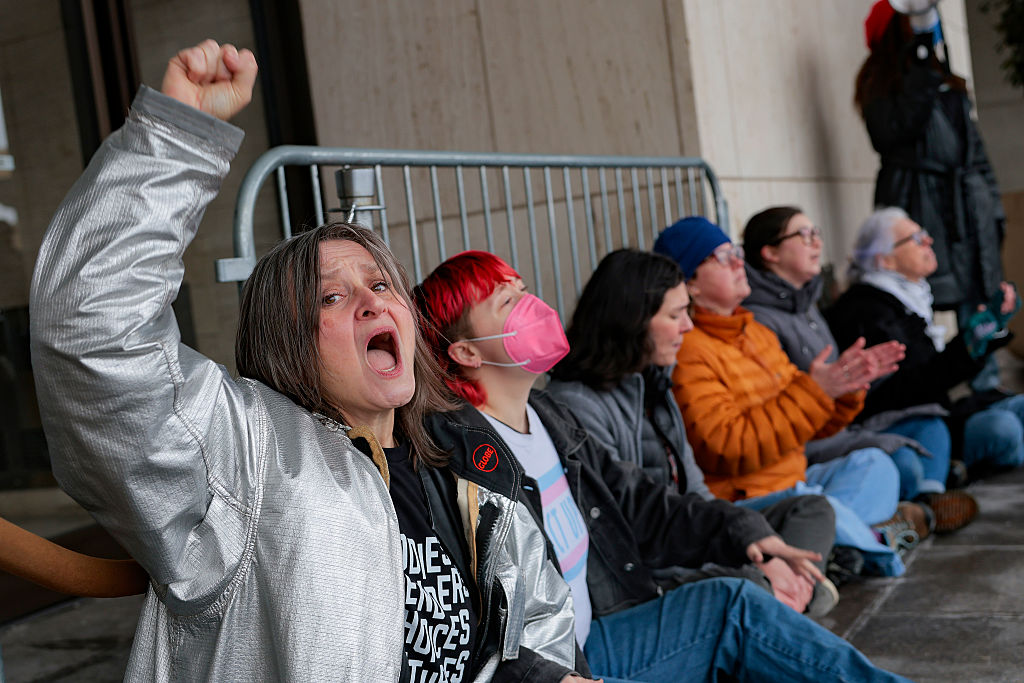How The CDC Word Ban Bears An Eerie Similarity To The Aids Crisis

History is repeating itself.

In an announcement last week that many have compared to works of dystopian science fiction, the Center for Disease Control (CDC) received a list of seven words to be banned from all 2018 budget requests. The words were: vulnerable, entitlement, transgender, fetus, science-based, evidence-based, and diversity.
The announcement is chilling, another painful blow in the bizarre and dangerous political climate we currently find ourselves in. What feels equally striking is that for LGBTQIA+ people, this is not necessarily a marker that we’ve entered into a dystopian future, but rather a very clear case of history repeating itself. After all, government institutions have long deployed a tactic of denying healthcare to LGBTQIA+ people and other marginalized populations in order to more or less legally discriminate against us. And they’ve done so through words.
A look at similar instances from the past and the harmful effects of those instances is a sobering reminder of the power of words and the dangers that can arise from both their inclusion and exclusion in crucial public discourse.
One of the first things that came to mind was the long history of queer and trans people being labeled as “mentally ill.” Such proclamations date back to the late-19th century when homosexuality shifted from the realm of religious sin to mental disorder, and in doing so became a thing to be treated and cured.
Although Sigmund Freud cast doubt on the idea that homosexuality could be “cured,” his fundamental theory that all humans are bisexual led many to believe that queer people could be more or less made straight and cisgender through psychological interventions. Efforts to “convert” queer people intensified from that point, and in the 1950s and 60s treatments including electroshock therapy, lobotomies, and, in some cases, castration became common practice.
Transgender people have likewise long been subject to such interventions. One of the more notorious cases is the work of Kenneth Zucker, a Canadian psychologist and sexologist who has practiced a version of conversion therapy on at least 500 gender-variant kids since the mid-1970’s. His controversial methods aim to force children to align with the gender they were assigned at birth rather than support them in their gender identities. It was a similar practice that led to the tragic suicide of trans teen Leelah Alcorn in 2014.
Homosexuality remained a mental disorder in the eyes of health professional until it was finally removed from the Diagnostic and Statistical Manual of Mental Disorders (DSM) in 1987. It was only in 2013 that the DSM entry on trans people was shifted from “gender identity disorder” to “gender dysphoria,” the experience of anxiety that some trans people experience from feeling their bodies and their genders are misaligned.
The inclusion of homosexuality and transsexuality in the DSM, as well as the long history of classifying queer and trans people as mentally ill, demonstrates the power that words can have in shaping public opinion and medical practice. When queer and trans people are marked as mentally ill rather than a vulnerable population with specific needs, the focus remains on treating the perceived mental illness instead of providing resources and care to keep queer and trans people, who experience disproportionate violence and discrimination, healthy and safe.
And, it is because of the classification of queer and trans people as mentally ill that, despite the fact that health organizations including the American Psychological Association (APA) and the World Health Organization have found conversion therapy to be both ineffective and detrimental to the mental health of those who undergo it, conversion therapy remains in practice. To date, only nine US states have laws banning conversion therapy for minors while very few jurisdictions have banned the practice outright.
The inclusion of queer and trans people in the DSM overlapped with the HIV/AIDS crisis, by far the most glaring example of government discrimination and neglect against LGBTQIA+ people. From the epidemic’s start in 1981 through 1987, nearly 17,000 US citizens died due to complications from AIDS. However, it took President Reagan those six long years to make his first statement on the epidemic in 1987. Let this show us the power and danger of not saying certain words: Reagan’s inexcusable omission was a case in which the absence of a word that had the power to enact unfathomable harm. Even when the crisis was acknowledged, the government dragged its feet on funding and pushing through research and experimental treatments to combat the rapid spread of HIV.
The CDC played a particular role in propagating the HIV/AIDS crisis. In the early years of the epidemic, the CDC had an extremely narrow definition of HIV/AIDS based on the discriminatory assumption that HIV was a gay men’s disease. The definition excluded any of the opportunistic infections that impacted people with vaginas, meaning that those folks with HIV/AIDS were misdiagnosed or not diagnosed at all. Studies and experimental drugs that would focus on the issues particular to that population were almost non-existent because the CDC’s definition excluded words that might have led to the proper diagnoses of many women and trans people who were HIV-positive.
ACT UP activists staged several protests at the CDC and NIH headquarters, but it wasn’t until 1993 that the definition was changed. By then, the exclusion of these necessary terms had already had taken a devastating toll.
One of the more troubling government actions that was taken was the 1986 Supreme Court case Bowers v. Hardwick. In 1982, Atlanta resident Michael Hardwick was founding engaged in consensual oral sex with another man and was arrested. The charges were dropped, but Hardwick pursued the case all the way to the Supreme Court under the argument that anti-sodomy laws violated the 14th amendment. The Supreme Court decided against Hardwick, upholding state’s rights to criminalize certain sex acts between consenting adults.
Anal and oral sex, the mention of which had rather ironically been frequently excluded from medical materials and discourse on HIV/AIDS, were now legally etched in some state’s books as criminal behavior. Those with HIV/AIDS thus faced not only government neglect and discrimination in medical institutions, but also the fear that in some states they might be criminalized if found to be HIV-positive. Important information about HIV in relation to anal and oral sex became even harder to find in many places.
In light of the brief history I’ve provided here, the current convergence of events feels truly eerie. Truly threatening.
President Trump has taken actions to actively exclude LGBTQIA+ people from the census and to keep LGBTQIA+ reporters from government functions. He also rolled back Obama-era protections allowing trans students to use the bathroom of their choosing and, albeit unsuccessfully, pursued a ban on trans people serving in the military. And, Vice President Pence has long been a proponent of gay conversion therapy.
The Supreme Court is currently hearing a case of a gay Colorado couple versus a baker who refused to bake them a wedding cake on religious grounds. A ruling in favor of the baker could potentially allow businesses and even medical institutions to openly discriminate against LGBTQIA+ people under the guise of religious freedom.
And, now with the CDC’s exclusion of seven critical words, this moment feels hauntingly familiar.
While the political climate for queer and trans people is in some regards better than it was in the cases I’ve brought up, we still need sensitive medical care and resources more than ever before. According to the 2015 US Trans Survey, transgender people are still five times more likely to be HIV-positive than cisgender people. Black trans women have especially high rates of HIV at nearly one in five.
As trans people continue to face discrimination in medical care, this is a moment where we desperately need to be included in research and resources related to our healthcare. The 2015 US Trans Survey found that 55 percent of trans people had been denied coverage of transition-related surgery, 33 percent of us had at least one negative experience with a health professional in the year prior to the survey, and 23 percent of us avoided seeking out healthcare for fear of discrimination.
And, despite the fact that the out trans population appears to be increasing, to date there has yet to be a much-needed significant study of the long-term effects of hormone replacement therapy, surgical interventions, and the overall mental and physical health of transgender people over time.
The exclusion of the term “transgender” from CDC budgets means that resources allocated towards managing the particular health concerns of trans people and studying the transgender population– resources that were already barely there in the first place– could vanish.
In addition, all LGBTQIA+ people are more likely to be low-income than our cisgender, straight counterparts and we struggle to access affordable, affirming healthcare. The Affordable Care Act dramatically decreased the number of uninsured LGBTQIA+ Americans, meaning any attack on affordable healthcare for low-income people would likely have major consequences for the health of queer and trans people. Without access to healthcare, and without the CDC and other government institutions providing accurate information and necessary resources, the effects on the LGBTQIA+ community could be devastating.
So, yes, the exclusion of these words may not seem as harmful as outright discriminatory action. And, yes, this moment may feel like something fresh from a frightening authoritarian future rather than the latest instance in a long history of such actions. But we have been here before. And we know the effects.
Words have power, and the health and wellbeing of LGBTQIA+ and other Americans hinges on government institutions such as the CDC speaking and affirming these critical seven.
KC is a queer, non-binary writer based in Brooklyn, NY. You can find more of their work on their website www.kcclements.com or follow them @aminotfemme on Twitter and Instagram.












